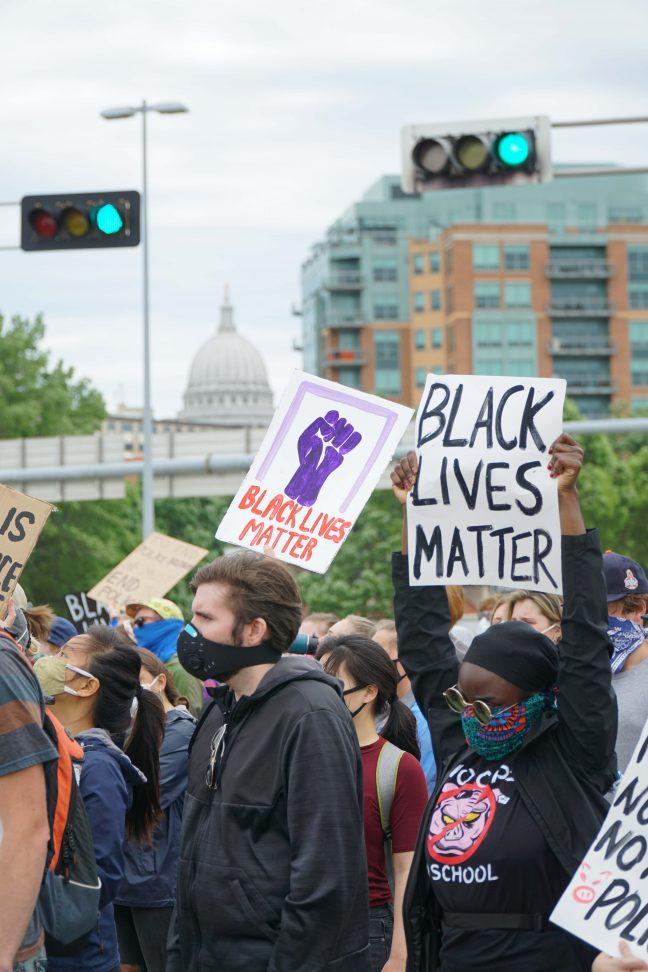University of Wisconsin students and administrators are not in agreement on issues of racial justice.
Last Tuesday, the Associated Students of Madison passed a vote of no confidence for UWPD, following the lead of organizations such as the UW BIPOC Coalition and the Teaching Assistants Association who have called for the defunding of UWPD. The next day, UW Chancellor Blank still asserted that she “hasn’t heard any specific complaints about incidents with UWPD officers.”
Despite these student voices calling to defund UWPD, administrators have also boasted about their deployment of UWPD officers to police off-campus gatherings, a move which increases the likelihood of police encounters with BIPOC students living off-campus. Students have reported UWPD officers not wearing masks while on duty and have voiced their distrust in the department regarding its handling of alcohol misconduct, instances of sexual assault and mental health crises.
Blank’s continued faith in UWPD undermines her claim to be “working on racial justice, equity and inclusion.”
Student leaders already know this claim to be a farce. Behind closed doors, Blank has made diminutive and condescending statements regarding student activism. She has consistently shot down BIPOC student leaders’ requests to meet and the demands they have made to feel welcome on campus.
Student activists — both graduate and undergraduate — refuse to allow Blank and UW to continue their gross mishandling of BIPOC student needs and mistreatment of BIPOC students on campus. The TAA and UW BIPOC Coalition demand that the University do more than just listen — it must take actionable steps to enact positive, systemic change for racial justice and equity on campus by including BIPOC voices in decision-making.
Instead of listening, UW administrators are actively working to silence student requests and deep-rooted concerns about racial justice on campus. Blank called the removal of the Abraham Lincoln statue — situated on a historical burial mound for Ho-Chunk people — a “non-starter,” despite knowing that Lincoln ordered the state execution of 38 Dakota men.
Blank insists on celebrating a man whose role in creating UW for white education led to the forced removal of Ho-Chunk people. In fact, Blank told student leaders that “[Lincoln] could have killed way more than he did.”
On a separate occasion, Blank asserted that removal of the Lincoln statue was “non-negotiable” because it would anger University donors, thus “it would not be good for the University.” Blank’s comments reveal that University dollars matter more to this administration than Indigenous lives — where have we heard that before?
UW administrators aren’t invested in involving students, workers or community members in decision-making for University policy. Blank met with Wisconsin Black Student Union and Wunk Sheek for one single one-hour meeting, and did so only after community pressure. She has refused to meet with the BIPOC Coalition, despite the Coalition’s insistence on the Chancellor’s presence at their meetings with administrators.
Blank stated in a recent blog post, “together we have the power to make meaningful change.” TAA and the BIPOC Coalition ask, just who is included in this “together?” If Blank truly wants to commit to working on racial justice, equity and inclusion, then she must equally include BIPOC voices in decision-making.
As students and workers on this campus, we must ask ourselves how we can pressure UW administrators to make good on their commitments.
First, we must get and stay organized on demands for racial justice. It’s true what the familiar protest chant says — united we stand, divided we fall. Support the demands of campus groups invested in racial justice. Organizations on campus must work together to offer a shared vision of the University we deserve, even while maintaining each group’s autonomy. One place to demonstrate this is by participating in the BIPOC Coalition and TAA’s rally this Friday, Oct. 9 at 4 p.m.
Second, we must remain vigilant of the decisions made by the UW administration, the City of Madison, Dane County and our state government. On Oct. 6, the Common Council voted against prohibiting MPD from using tear gas, mace and impact projectile devices until further research is conducted. Which nationally-recognized research institution will MPD partner with to complete that study? Our focus remains on the University and their troubling alliance with the fascist MPD, but we must keep all decision-makers in view.
Blank’s unwillingness to meet the demands of the BIPOC Coalition and TAA reveals her rhetoric about “non-starters” for what it is — her choice to maintain the University’s power structure.
The UW administration seems to have forgotten that the tuition dollars and labor of students, including BIPOC students, keep their facilities running and their salaries paid. TAA and BIPOC Coalition will graciously provide UW administrators with a reminder of that this Friday.
TAA and UW BIPOC Coalition are student-led organizations at UW-Madison.


